Updated 2:38 p.m. PST Jan. 21, 2014
[dropcap size=dropcap]A[/dropcap] new California law that took effect Jan. 1 allows public schools to punish students for cyberbullying that occurs off-campus. Superintendents or principals may now suspend or expel students for off-campus bullying that occurs via “an electronic act.”
In the past, California law allowed school administrators to discipline students only for cyberbullying that directly impacted a school activity or that was done on campus or while traveling to or from school.
“There is a lot more strength in the law now, so that schools can be more aggressive with a student who is bullying. In the past, it was difficult to define [cyberbullying] in a way that a student could be held accountable,” Foothill principal Joe Bova said.
“Let’s say on the weekend, Student A texts Student B and says horrible things about them. In the past, we had to be able to connect that weekend activity to something at the school,” Bova said.
“Our primary concern is not that the law will be enforced the way that it is written, but that the law will be enforced by people applying a zero-tolerance mentality,” said Frank LoMonte, executive director of the Student Press Law Center.
California Assembly Bill No. 256 defines bullying as “any severe or pervasive physical or verbal conduct” that can be “reasonably predicted” to harm a student’s mental or physical health, academic performance or ability to benefit from school activities, as well as cause a student to fear that harm may come to their, or another student’s, person or property.
The bill states that texts messages, sounds, images, and posts on social networking sites are all “electronic acts.” It also includes creating or posting to a “burn page,” an internet website intended to bully, or creating fake profiles for other students online.
First Amendment advocates concerned about law’s reach
The expanded law concerns First Amendment advocates, including Frank LoMonte, executive director of the Student Press Law Center.
“Our primary concern is not that the law will be enforced the way that it is written, but that the law will be enforced by people applying a zero-tolerance mentality,” LoMonte said.
“The concern is for the overzealous administrator who may step in at the first sign of a difference of opinion and start throwing people out of school,” he said.
[soundcloud url=”https://api.soundcloud.com/tracks/130078721″ params=”color=ff6600&auto_play=false&show_artwork=true” width=”100%” height=”166″ iframe=”true” /]
Ken Paulson, president of the First Amendment Center and former editor in chief of USA Today, said that this type of legislation is often applied too broadly by administrators.
“Students retain their free speech rights. It’s not something you get handed with a high school diploma, you have it as a citizen and as an American,” Paulson said. “The challenge for schools is to respect and protect the free speech of students unless that speech creates a clear and substantial disruption in the school.”
“If a student posted that Johnny Smith is a lousy quarterback and shouldn’t start Friday night for the team, that is going to have a detrimental effect on Johnny’s sense of self worth. But that’s certainly not bullying. You have to apply this kind of legislation with a healthy dose of common sense,” Paulson said.
Foothill assistant principal Carlos Cohen said students have a right to state their opinions but that it “becomes an issue when that student is going around, consistently posting (a derogatory comment about a student), re-posting it, adding to it, because now it’s no longer commentary, it’s becoming pervasive.”
“We live in the United States of America where we will die to defend our right for free speech, however that free speech doesn’t protect you from everything,” Foothill assistant principal Carlos Cohen said. “You can’t just say anything you want, wherever you want, at any time.”
Cohen said he believes the First Amendment does not guarantee the right to all speech.
“I don’t think just because you have a right to say something, that you should be able to say everything you want to say if it impacts people… you have the right to say whatever you want to say, but not if it’s hurtful,” Cohen said.
“We live in the United States of America where we will die to defend our right for free speech, however that free speech doesn’t protect you from everything,” Cohen said. “You can’t just say anything you want, wherever you want, at any time.”
LoMonte said he thinks some of the country’s new cyberbullying laws try to control off-campus online speech beyond where on-campus speech can be punished.

“I think it’s possible that under the typical cyberbullying law, students have fewer rights at home on a Saturday on Twitter than they do in the middle of the cafeteria on a Tuesday,” LoMonte said.
Foothill senior Joshua Ward said he is concerned with how the administration will interpret the definition of bullying.
“I think the overarching theme here is that there isn’t really any grounds to say what is bullying and what is not. It’s up to administration to decide what is bullying and what isn’t,” Ward said. “I think if they have the access to anything you’ve ever said on the internet and can directly affect your life at school because of it, I think that’s a little overstepping their boundary.”
Even clear advocates of increased measures to prevent electronic bullying express concerns.
The co-director of the Cyberbullying Research Center, which operates an online clearinghouse of information on the ways adolescents use and misuse technology, said the student fears about administrators applying the new California law too broadly may prove true.
“The short answer is that constitutionally protected speech that doesn’t disrupt the learning environment at school, or infringe on the rights of others, should not be punished,” said Justin W. Patchin, a professor at the University of Wisconsin-Eau Claire and the author of a new book “Words Wound: Delete Cyberbullying and Make Kindness Go Viral.”
“It may take a few cases to determine exactly where that line is,” he said in an email to the Dragon Press.
“Our bullying laws had to reflect the reality students live in today”
The bill’s author thinks freedom of speech does not necessarily pertain to all situations.
“The reality is, I don’t think freedom of speech is absolute,” said Assemblywoman Cristina Garcia, D-Bell Gardens.
“I think we have other rights and liberties that we need to protect also along the way, and there’s a give and take,” Garcia said. “Once it gets to a point where a student can’t learn and can’t meet their potential, the right to learn and have a safe environment trumps freedom of speech.”
This law is necessary because of the increase in student suicides after being cyberbullied, said Garcia, a former teacher.
“Cyberbullying affects you no matter if it’s done at school or out. I was cyberbullied,” Foothill senior Cali Mahoney said. “It completely changes the way you interact at school. I got super depressed, and that affected my schoolwork.”
“It was a combination of having been in the classroom for so long and feeling that our bullying laws or rules had to reflect the reality students live in today,” she said. “In addition to this, last year there were a number of cases in the media where young girls had taken their lives… after being cyber bullied by their harassers.”
A 2011 AP-MTV poll found 56 percent of 14-24 year-olds have “experienced abuse through social and digital media,” while 75 percent believe digital abuse to be a serious problem.
Paulson said it is important to find and address the real cases of cyberbullying, rather than “loose talk” from high school students.
“News stories about young people taking their lives after being bullied have generated a lot of concern,” he said. “These are dramatic and powerful stories, and no one wants to see a young person take his or her life. This is a real problem, but it’s important that we not overreact.”
AB 256 passed in the California Assembly of Education, the Assembly, the Senate of Education, and the Senate with only one “no” vote recorded. Gov. Jerry Brown signed the bill into law on Oct. 10, and it took effect Jan. 1.
A December report from the Cyberbullying Research Center, shows California joins 46 other states that have laws against electronic harassment and 17 that have laws that include the term “cyber bullying.”

Additionally, California is now one of 12 states to allow schools to punish students for off-campus cyberbullying. Arkansas, Connecticut, Florida, Louisiana, Massachusetts, New Hampshire, New Jersey, New York, South Dakota, Tennessee and Vermont have similar laws. Two states, Georgia and Nebraska, are considering the change. The law is federally recognized only in the District of Columbia.
Bova said that even with the expanded law in place, administration would have to be aware of a cyberbullying problem to take action.
“If a kid comes to us, of course we’re going to investigate it. Typically when they come to us, it’s because it’s affecting them,” Bova said.
Cohen said the school has disciplined students for out-of-school cyberbullying prior to this law, including cyberbullying that is not related to a school activity.
“That’s where there’s a little bit of grey. If a student is so impacted by what was being done… and they’re being affected to the point where they’re embarrassed to come to school, it’s affecting their grades, it’s affecting their overall well-being on campus, that falls into the definition (of impacting a student activity) right there and we can step in and address it,” Cohen said.
“If it disrupts the learning process, school administrators have every right to do whatever is necessary to put the school back on track, ” he said.
[soundcloud url=”https://api.soundcloud.com/tracks/129932836?secret_token=s-ILBCv” params=”color=ff6600&auto_play=false&show_artwork=true” width=”100%” height=”166″ iframe=”true” /]
Foothill senior Cali Mahoney said that being cyberbullied caused problems for her throughout school.
“Cyberbullying affects you no matter if it’s done at school or out. I was cyberbullied,” Mahoney said. “It completely changes the way you interact at school. I got super depressed, and that affected my schoolwork.”
Bullying in person is rare at Foothill. Administrators say most suspensions for bullying this school year have been for cyberbullying, and, while they have the power to move students to other schools for cyberbullying, it has never been found to be necessary at Foothill. No students have ever been expelled for such behavior, Bova said.
Students this year have been disciplined for saying hurtful comments on social media websites and for sending derogatory messages. Students have also been punished for creating Instagram collages of a student, coupled with a disparaging caption.
Foothill administrators have also dealt with cyberbullying of Foothill students from pupils on other school campuses. When that happens, the two schools work together to gather information on the situation and solve the problem.
Foothill students have been disciplined for posting and “favoriting” derogatory tweets
Senior Liam Egan said he understands the reason for the expanded law.
“It’s the school’s duty to protect the well being of their students, and if that extends to something that a student might be doing outside of school, then they have the moral prerogative to punish them,” Egan said.
Senior Tristan Wedderien said he questions if schools should be getting involved in what a student does outside of school.
“I just feel like that’s the student’s personal life, and the school has no purpose [to get involved],” Wedderien said.
“I think it’s intended [for] when you have girls that get raped, and then people are telling them to get over it and go kill themselves everyday, and it’s hundreds of people telling them that, and it’s constantly being spread around, that’s what it’s intended for,” Assemblywoman Cristina Garcia said.
Egan and Wedderien said that they had both been featured negatively on an Instagram profile titled “Foothill’s Worst.”
“There was some Instagram or ‘Foothill Worsts’ that happened this year, the year before, and when we find out about it we bring all those students in and call all of their parents and say, ‘This needs to stop.’ We would definitely deal with those situations,” said Bova.
Foothill students have also been disciplined for posting hurtful tweets, as well as for supporting a derogatory tweet by “favoriting” it.
“They supported the student by saying, ‘I like that statement made about that kid.’ Well, in our opinion, and under the law, we believe that’s also intimidating, harassing, hurtful to a student,” Bova said.
However, Assemblywoman Garcia said that the law was not intended for one time events where a student says something on a social media website that hurts another student, but rather for very serious and continuous bullying.
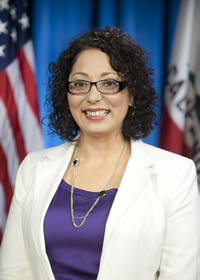
“I think it’s intended [for] when you have girls that get raped, and then people are telling them to get over it and go kill themselves everyday, and it’s hundreds of people telling them that, and it’s constantly being spread around, that’s what it’s intended for,” she said.
Garcia said students who believe a school administration is limiting student speech illegally could take legal action.
“If someone thinks the school is overstepping the bounds with what this law is supposed to do, they could sue the school, and the judge will decide where the line is clearly drawn there,” Garcia said.
Posts on digital media could be misinterpreted
Twitter and Facebook posts or cellphone texts can be easily misinterpreted by school administrators, said LoMonte of the Student Press Law Center.
“It’s one thing if the speech is on school grounds where it’s witnessed by a teacher or a staff member, but when you’re talking about a bunch of abbreviations and symbols in a text message, it’s really, really easy for harmless speech to be misunderstood. People use figures of speech and sarcasm on social media and in texting that might be misunderstood by a disciplinarian,” LoMonte said.
Junior Allison Champagne said she thinks that jokes or smaller acts that are perceived as bullying shouldn’t be handled by the administration.
“If it’s really minor, I don’t think you need to bring it to school,” Champagne said.
Bova said that if the case of cyberbullying was minor, the school would not get involved.
“I think that some people could certainly overreach in these cases. We certainly want students to have the right to express their opinions, and they can express their opinions about a range of issues and express their opinions about people on the campus, staff…. other students too,” Foothill principal Joe Bova said.
However, Cohen said that school administrators will address every issue of cyber bullying, whether through speaking to the students or taking further disciplinary measures, that a student brings to them.
“For us at Foothill, every kid’s safety, their physical and emotional well being, is really important for us, so something does not have to be very severe. If someone on Instagram or on Twitter started saying that so-and-so is a hoe, and the picture is posted with that caption, and it’s being sent around, that’s enough right there for us to bring the person in,” Cohen said.
Foothill uses due process in bullying investigations
An investigation for bullying at Foothill has a few steps. Cohen said the first step is to get information from the bullied person, including a list of any people that might of seen or heard about the situation.
Then, those people are talked to and the administration gathers as much information as possible. The person who did the bullying, or online posting, is called in and they are given an opportunity to share their side.
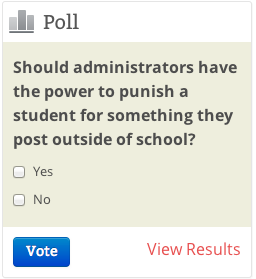 “It’s called ‘due process’, [we] make sure they get an opportunity to share their side. If in fact they say that they did [bully], and it’s a first time offense, and it’s not something that causes a kid to miss school, or something like that, then we’ll give them a consequence that could range anything from a detention… to a few days detention and a reflective (writing) piece,” Cohen said.
“It’s called ‘due process’, [we] make sure they get an opportunity to share their side. If in fact they say that they did [bully], and it’s a first time offense, and it’s not something that causes a kid to miss school, or something like that, then we’ll give them a consequence that could range anything from a detention… to a few days detention and a reflective (writing) piece,” Cohen said.
After that, the students are brought together to have a conversation about the issue and reconcile. The administration will also check up with the students to make sure the bullying has stopped.
“If it’s really bad, like lets say they said something really heinous of a sexual, gender, race, disability and it’s very strongly worded, mean-spirited, that any reasonable person would say, ‘Oh, that isn’t acceptable,’ we skip certain consequences. We still go through the due process, but we may not give detention. We might just do a suspension if it’s really bad,” Cohen said.
[soundcloud url=”https://api.soundcloud.com/tracks/130072122?secret_token=s-QK4mu” params=”color=ff6600&auto_play=false&show_artwork=true” width=”100%” height=”166″ iframe=”true” /]
Bova said he thinks that if the new cyberbullying law is handled by administrations in the wrong way, it could be an infringement on student rights.
“I think that some people could certainly overreach in these cases. We certainly want students to have the right to express their opinions, and they can express their opinions about a range of issues and express their opinions about people on the campus, staff…. other students too,” Bova said.
LoMonte said he agrees that students have the right to speak their mind and share their opinions on other students.
“You can’t have an environment where there’s zero-tolerance for mild unkindness, because you’re never going to take mild unkindness out of life,” LoMonte said.
Bova said Foothill administrators will focus on investigating clear examples of cyberbullying rather than more minor student conflicts.
“We’re talking about situations where students specifically put something up for a greater audience to harm somebody else. That’s what we’re going to be more serious about,” Bova said. “We have plenty of stuff to do during the day. We’re not looking to go out and find every little piece of teenage conflict, because that is constant.”


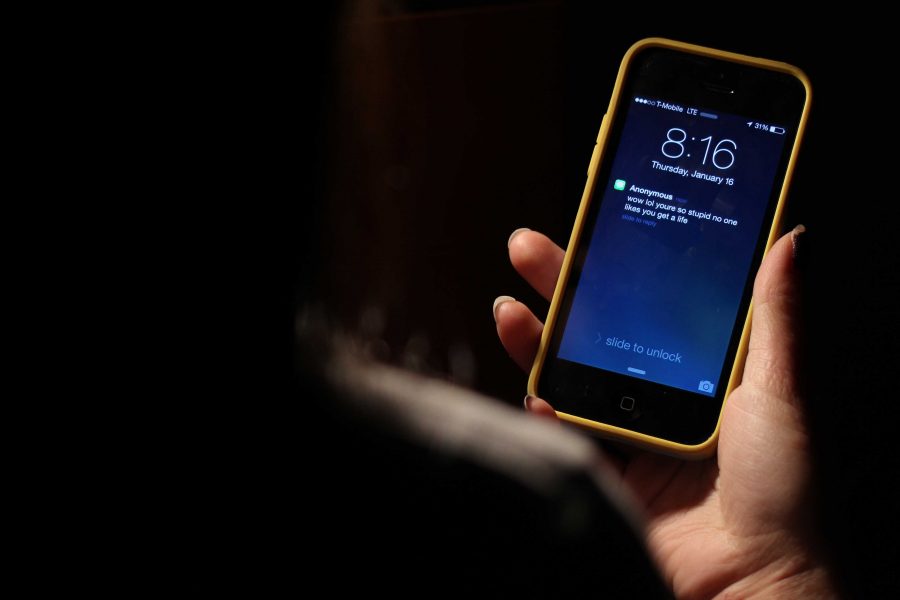


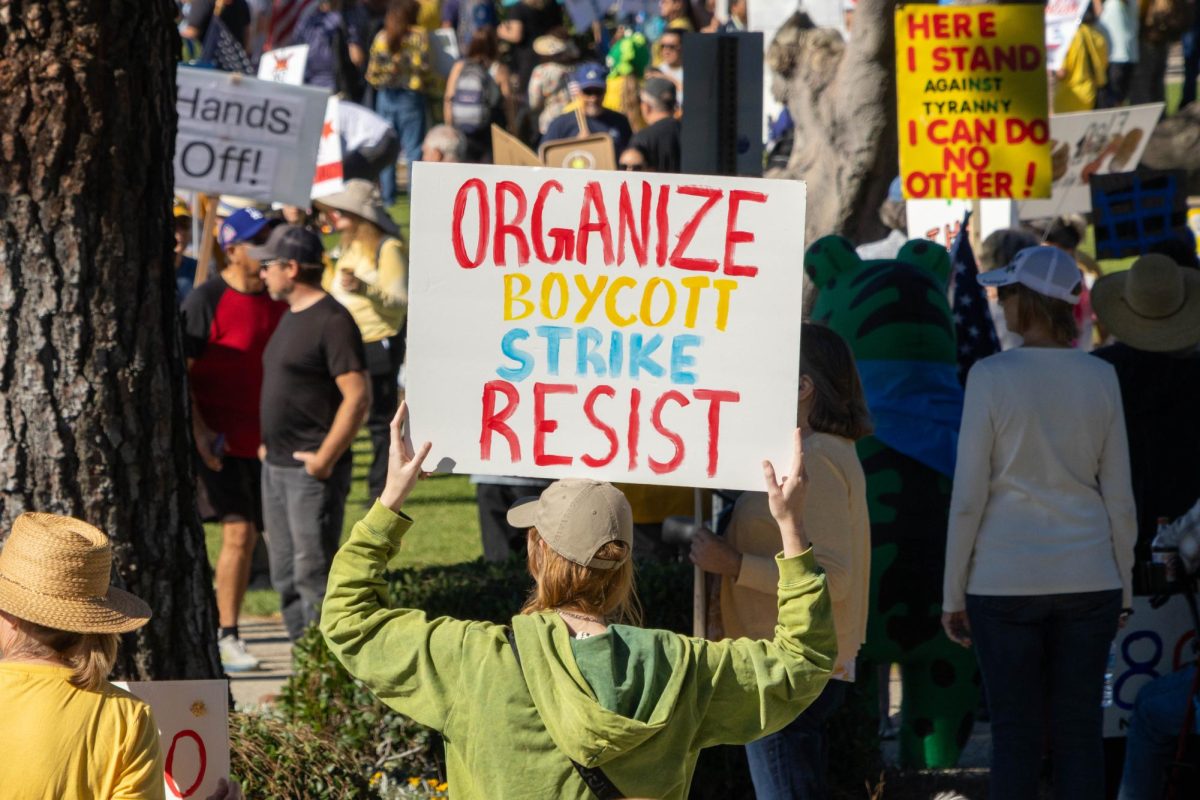
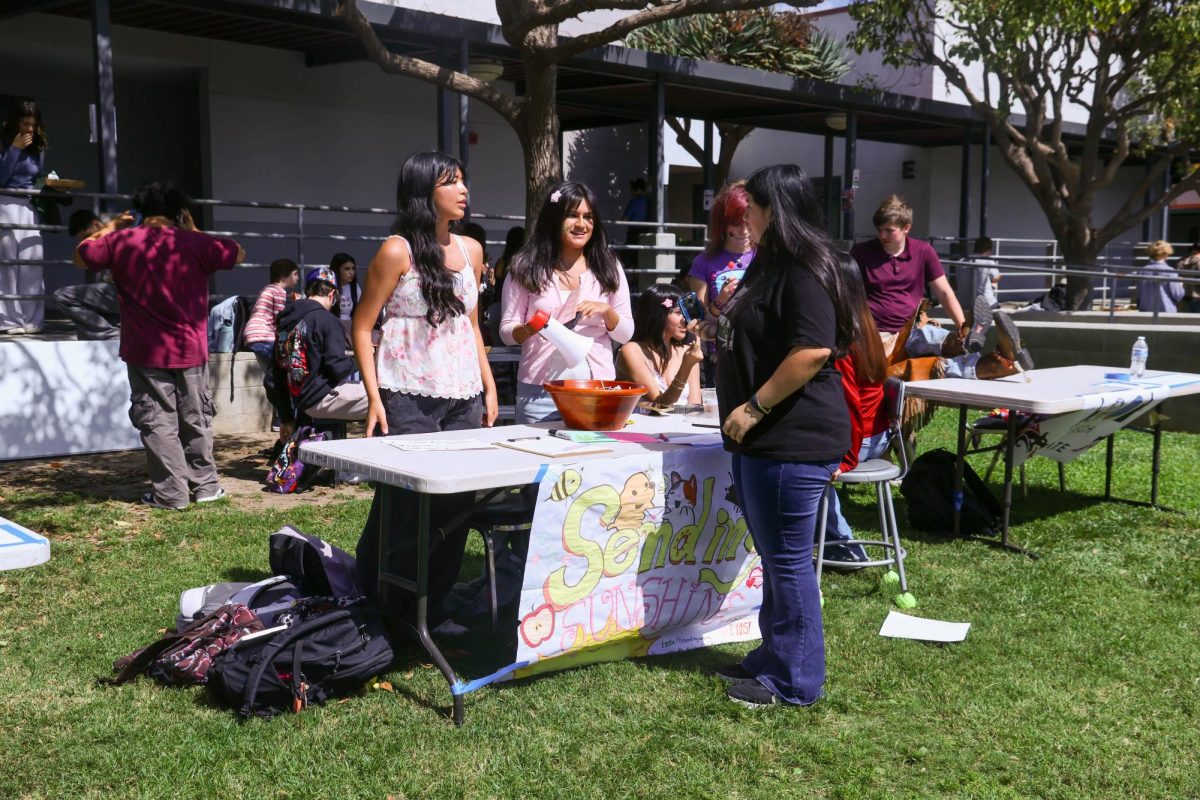



Chris Ballmer • Jan 21, 2014 at 1:54 pm
I believe it is right to give leaders of schools the tools to punish bulliers, and to interpret what that looks like.
They have been chosen, supposedly, because they are FOR the students, remember, and with that comes disciplinary power, because they work with people who need a measure of ‘rule’ to maintain peace, like society in general. Besides, if there is no one to uphold the ‘laws’ there is only the hope people will self-govern… that doesn’t seem likely in school, in fact it doesn’t happen, at least completely. It’s the parts where there are breaches that we are talking about, the minority of fools of whom we speak.
Sometimes you got to save your freedom of speech ticket for when it counts…the face of oppression, punishing bullies is not oppression, it is right.
This is a situation where highly evolved beings are causing pain to others, and other beings are responsible to end it, the alternative has been shockingly tragic and has gone on long enough. Thank you Fidelity for writing so poignantly about this, it has educated and inspired me.
Sabrena Rodriguez • Jan 21, 2014 at 9:25 am
I don’t think anyone’s protection from the First Amendment is being called into question here. You have the ‘right’ to say whatever you would like. However, the First Amendment does not protect you from the consequences of those actions. As a person with free will, you can make many choices that will bring consequences or punishment from society. What we do, how we treat people, what we say, all matters. Too often people hide behind their ‘right’ to do something, rather than considering their responsibility to their community and to their fellow human beings.
Ami Ballmer • Jan 18, 2014 at 9:05 pm
There is a certain amount of conflict that happens naturally, and I’m worried that this bill will give administrators the ability to punish students for these natural inter-personal conflicts. There is no set definition of bullying, let alone cyber bullying, and this bill is too general on what is punishable and what is not. Because of this vagueness, we shouldn’t give the administration more power to curtail free speech. Cohen said that you don’t have a right to say things that are “hurtful”. I’ve been hurt by editorials on the press, comments made in my classes, and even things teachers have said, but I’ll defend their rights to say those things. Conflict and disagreement is natural, and while the administration says they’ll only punish “serious cases”, I’m not sure that I trust the law will be implemented fairly. Giving the administration the power to punish students for things they said completely unrelated to school and in their own house is a total breach of the First Amendment Rights. Yes, students don’t have a whole lots of rights (as evidenced by the drug dogs), but we should try to preserve one of the most basic rights, that to free speech.
Sheila Genova • Jan 21, 2014 at 8:43 am
I see cyber bullying as a problem. The law preventing this doesn’t have to be vague. Seems like the administration at Ventura High School has a good grip and the ability to handle each problem or case fairly and effectively. Constant mean things said over and over about someone on-line, and then other students chiming in can be very detrimental. I think it needs to be “nipped-in-the-bud” before it progresses in to something really ugly. As adults they call it “Slander”. One can sue another for mean, hurtful, untrue remarks that we’re said to hurt their character. Better for students to know this now. It’s not o.k. to say mean, spiteful comments on-line over and over to embarrass, harass hurt someone. We all need to learn to be respectful, nice and mature.